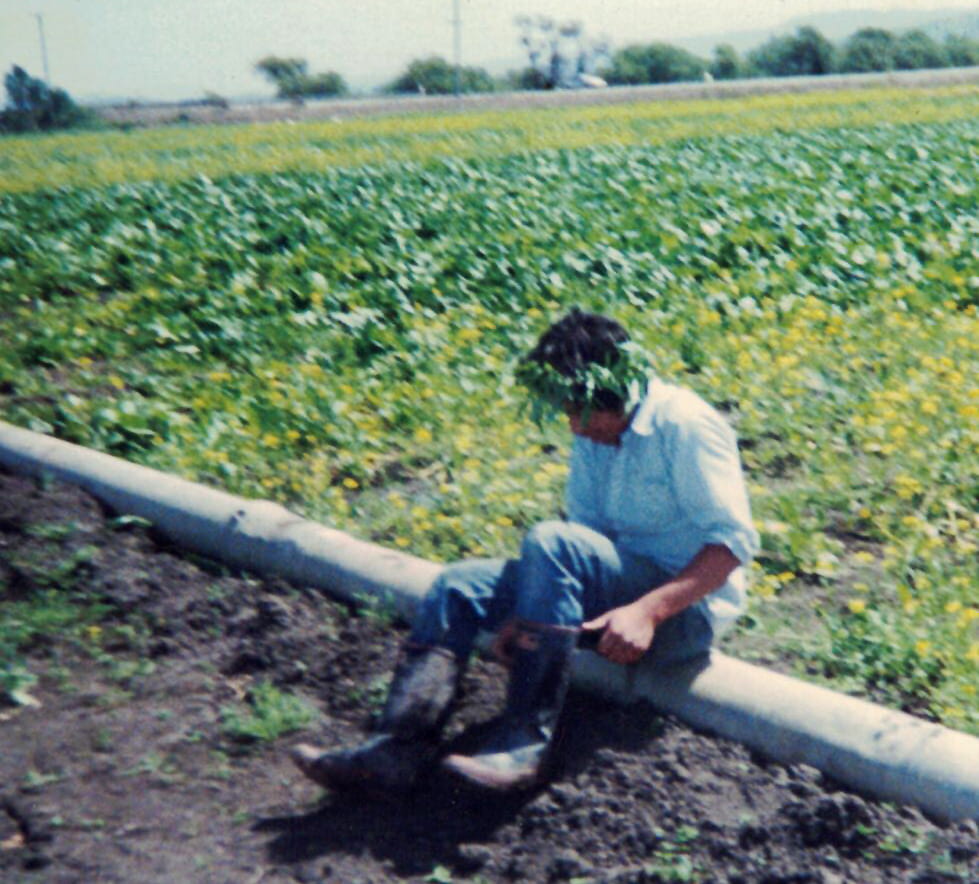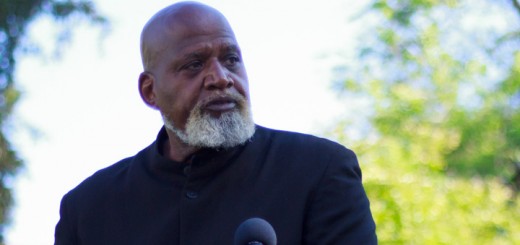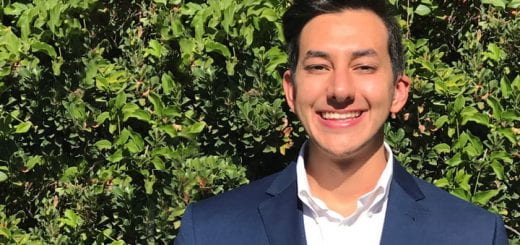Like Father, Like Son
Pabel Mijangos, ’20 Finance, has a picture of his father Octavio from his early days as a laborer in Watsonville, Calif., where he immigrated to the United States from Mexico as a teenager. Dressed in jeans, a sweatshirt and a denim jacket, Octavio sits cross-legged on a mattress fashioned from pallets, hay and sheets folded over wood. This was his American bed—his first, after sleeping under bridges and in the elements for seven months. It was the early 1980s, years before Octavio would meet his wife Dolores, before his daughter Xochitl would graduate from Santa Clara University and get a job at Ernst and Young, before his two sons would enroll in college, Octavio Jr. at Evergreen Valley College and Pabel at San Jose State. Looking through Octavio’s photos, Pabel is amazed and humbled by his father’s journey.
“He started from the bottom and he worked his way up to where he’s at now—foreman at a big construction company—and I find that inspiring,” says Pabel. “He created opportunities for his family back home and for me too.”
Two decades before Pabel was born, Octavio was smuggled across the Mexico-U.S. border as a teenager. Born to a family of ten children in a rural Oaxaca town, Octavio lost his own father at age eight and began working to support his family as a child. Forced to choose between pursuing his education and supporting his mother and siblings, Octavio looked north, always with the intention of returning to his hometown. What happened instead, writes Pabel in his spring 2019 Global Dimensions of Business paper, were a series of obstacles, hard-won achievements and happy accidents that led to Pabel’s path to an education at San Jose State.
“Many people grow up perceiving their father as a heroic figure,” Pabel writes in his paper’s opening line. “I am fortunate to be one of them.”
The assignment asked students to write about an international topic to which they felt personally connected. For Pabel, the answer was immediate: he needed to interview his father. Though he had heard his father’s stories throughout his childhood, it was different to view Octavio’s journey through the lens of a business class. It prompted Pabel to reflect on the American dream—did his father have one? And did he achieve it?
Tempest-Tossed and Ready to Work
When his son approached him for an interview, Octavio was flattered and surprised.
“It makes me emotional because he was asking me how I got here, what did I do to get here, and why I came here as a young person,” says Octavio. “I had told him some stories about when I was working in the fields, sleeping under bridges and in the fields of Milpitas and Gilroy.”
Octavio says no one had ever asked him about his experience immigrating to the U.S. or probed why he had needed to leave his hometown. Undeterred by years of labor, sometimes at the mercy of employers who took advantage of his limited English skills, Octavio summarizes his first 15 years in the U.S. in one word: hard. Despite this, he was able to continue supporting his mother and siblings in Mexico while negotiating the challenges of coming to a new country.
Along the way, he began taking night classes to improve his English, met his life partner Dolores, and applied for residency through the Immigration Reform and Control Act of 1986, which granted him legal status in the U.S. and expanded his work opportunities. Dolores gained legal residency in 2001, and in 2006 she earned her citizenship. As their family grew, Octavio realized he would not be moving back to Mexico as originally planned. He had worked too hard to establish a new life and had new goals: to provide for his wife and children, to buy a house, and to one day become foreman at a construction company.
“He started off as a laborer … he would pick up trash, carry wood, shovel—all things that he quickly tired of,” Pabel writes. “As a person who loves to learn things in order to strive for a better future, he learned how to read blueprint drawings, manage people and other soft skills. It was all with the hope to be promoted to foreman.”
Yearning to Breathe Free
Despite years of long hours and hard work, sometimes at less than minimum wage, Pabel says his father always put family first. After losing his father at such a young age, it was important for Octavio to be there for his three kids. In 2000, several years after arriving in California, Octavio and Dolores bought a house. Six years later, he accepted a job at Bill Brown Construction, where he later was promoted to foreman. Together, he and Dolores prioritized education so their children would have greater opportunities.
While he is attending SJSU, Pabel has been working alongside Octavio at the construction company, working a day of work a week with a full course load.
“Many people grow up perceiving their father as a heroic figure. I am fortunate to be one of them.”
—Pabel Mijangos, ’20 Finance
“I have been trying to give my kids as much education as they can get,” says Octavio. “I learned English a little bit at a time, starting with a few hours a week. I like working with my son but I don’t want him to work in this field. I want him to have a bachelor’s degree so he can do whatever he wants after that.”
In January 2019, Pabel and Octavio worked side-by-side on a major project. Together they were part of the 20-person crew that moved San Jose State’s historic Schelling House from its previous location opposite Duncan Hall to its new home on Tenth and East San Antonio streets. Octavio was one of the foremen that directed the 400,000-pound, 6,500-square-foot house down Fourth Street, along San Fernando and down Tenth, overseeing the team. It was an important day for both Mijangos men.
“That was a project I never dreamed of being involved in, nevertheless being foreman of,” says Octavio. “How could it be that I could be the foreman of such a project when I never had a chance to go to school myself? It’s not easy to be a foreman in a company in the U.S., and I never thought I would be here, nearly 40 years later. But dreams do come true.”
“It was an amazing experience,” agrees Pabel. “It meant a lot to me that it happened at SJSU.”
When asked about his own American dream, Pabel says that he hopes to find a job in finance—but like his father, his priority is making his family happy.
“I want to make my parents happy because they didn’t have the opportunity to get an education themselves,” Pabel says. “It’s important to listen to your parents. I really listened and for me it has worked.”







